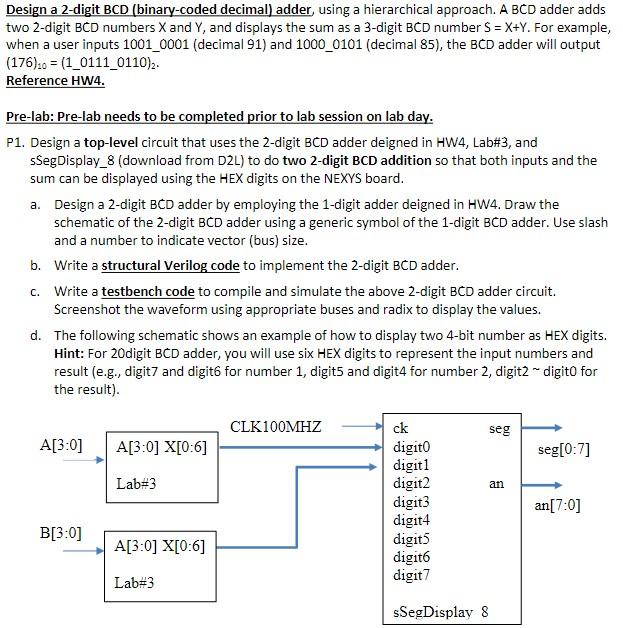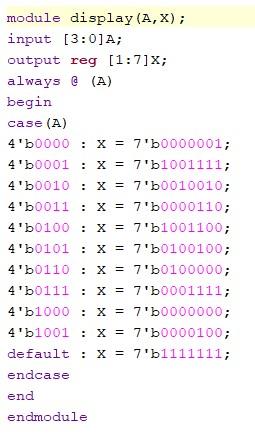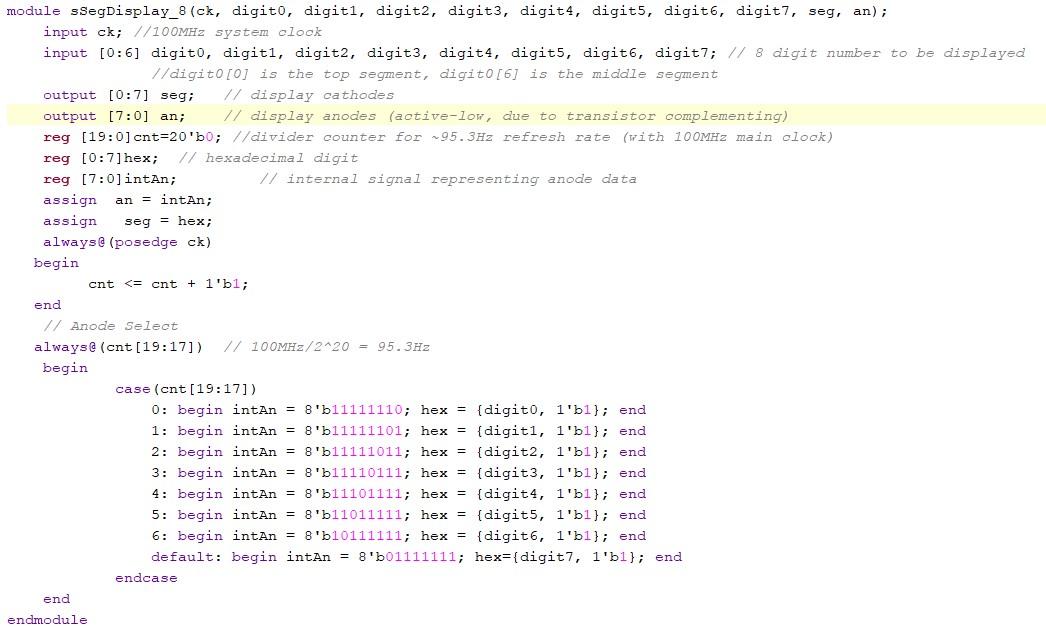Question: Please solve clearly and in detail. Will upvote if functional. Thank you. Lab#3 sSegDisplay_8 Design a 2-digit BCD (binary-coded decimal) adder, using a hierarchical approach.
Please solve clearly and in detail.
Will upvote if functional.
Thank you.

Lab#3

sSegDisplay_8

Design a 2-digit BCD (binary-coded decimal) adder, using a hierarchical approach. A BCD adder adds two 2-digit BCD numbers X and Y, and displays the sum as a 3-digit BCD number S=X+Y. For example, when a user inputs 1001_0001 (decimal 91) and 1000_0101 (decimal 85), the BCD adder will output (176)10=(1_0111_0110)2. Reference HW4. Pre-lab: Pre-lab needs to be completed prior to lab session on lab day. P1. Design a top-level circuit that uses the 2-digit BCD adder deigned in HW4, Lab\#3, and sSegDisplay_8 (download from D2L ) to do two 2-digit BCD addition so that both inputs and the sum can be displayed using the HEX digits on the NEXYS board. a. Design a 2-digit BCD adder by employing the 1-digit adder deigned in HW4. Draw the schematic of the 2-digit BCD adder using a generic symbol of the 1-digit BCD adder. Use slash and a number to indicate vector (bus) size. b. Write a structural Verilog code to implement the 2-digit BCD adder. c. Write a testbench code to compile and simulate the above 2-digit BCD adder circuit. Screenshot the waveform using appropriate buses and radix to display the values. d. The following schematic shows an example of how to display two 4-bit number as HEX digits. Hint: For 20digit BCD adder, you will use six HEX digits to represent the input numbers and result (e.g., digit7 and digit6 for number 1 , digit5 and digit4 for number 2 , digit2 digit0 for Design a 2-digit BCD (binary-coded decimal) adder, using a hierarchical approach. A BCD adder adds two 2-digit BCD numbers X and Y, and displays the sum as a 3-digit BCD number S=X+Y. For example, when a user inputs 1001_0001 (decimal 91) and 1000_0101 (decimal 85), the BCD adder will output (176)10=(1_0111_0110)2. Reference HW4. Pre-lab: Pre-lab needs to be completed prior to lab session on lab day. P1. Design a top-level circuit that uses the 2-digit BCD adder deigned in HW4, Lab\#3, and sSegDisplay_8 (download from D2L ) to do two 2-digit BCD addition so that both inputs and the sum can be displayed using the HEX digits on the NEXYS board. a. Design a 2-digit BCD adder by employing the 1-digit adder deigned in HW4. Draw the schematic of the 2-digit BCD adder using a generic symbol of the 1-digit BCD adder. Use slash and a number to indicate vector (bus) size. b. Write a structural Verilog code to implement the 2-digit BCD adder. c. Write a testbench code to compile and simulate the above 2-digit BCD adder circuit. Screenshot the waveform using appropriate buses and radix to display the values. d. The following schematic shows an example of how to display two 4-bit number as HEX digits. Hint: For 20digit BCD adder, you will use six HEX digits to represent the input numbers and result (e.g., digit7 and digit6 for number 1 , digit5 and digit4 for number 2 , digit2 digit0 for
Step by Step Solution
There are 3 Steps involved in it

Get step-by-step solutions from verified subject matter experts


